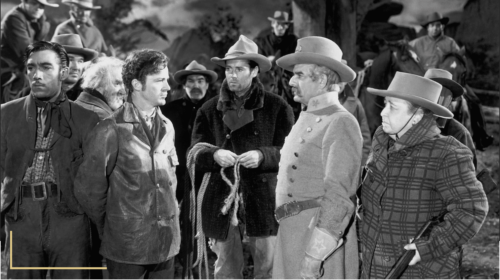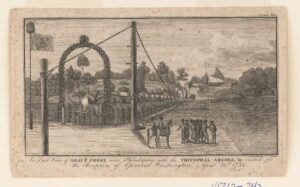
The Ox-Bow Incident: Walter Van Tilburg Clark’s Critique of the Western
The American “western,” in the novels of Owen Wister, the stories of Zane Grey, and numerous films of the 1950s and early 1960s, enshrines an American folk understanding of the way political life arises from a state of nature. The western depicts wary cowboys, farmers and ranchers trying their luck on a frontier where law does not yet fully exist. In this situation, might prevails over right until one courageous man stands up and defends the threatened life, liberty, property—or woman—of another. When the man who fights for others’ rights wins—whether on his own or with a secret hand up from John Wayne—other characters in the story consent to his right to rule as sheriff or Senator. The standard western is a morality play showing rugged individualists uniting in allegiance to a system of just laws.
The American west, however, was also the scene of vigilantism. Among the first to comment on this tradition was the author Walter Van Tilburg Clark. I recently read his novel The Ox-Bow Incident (1940). Set in 1880s Nevada, the story opens as two cowboys ride into a foothill town, looking for a little R & R after roundup season. They get drawn into a vigilante action to find and hang men suspected of murdering a ranch hand while rustling cattle. Clark shows the iconic individualist—the cowboy—irresistibly drawn into colluding with other supposed individualists who are convinced their independent way of life is threatened.
Part of what draws the cowboys to join in the lynch mob is their uneasy feeling that the men in town suspect them as the rustlers. Others in the mob seem to fear the same, or fear to be thought cowards. Few in the mob have much of their own to protect: they are mostly single ranch hands working for others, subsisting on minimal wages between payday binges at the foothill town’s saloon. Yet they are quickly persuaded by the speech of one who asks:
If we wait, I tell you, there won’t be one head of anybody’s cattle left in the meadow by the time we get justice. . . . Are we going to slink on our own range like a pack of sniveling boys, and wait till we can’t buy the boots for our own feet, before we do anything? . . . Maybe if we do one job with our own hands, the law will get a move on. . . . One thing is sure. If we do this job ourselves, and now, it will be one that won’t have to be done again.
I found myself fascinated by the efforts of a few of the characters to persuade the others to stop and think. The pastor of the town’s only church lectures his fellow citizens, “Let us not act hastily; let us not do what we will later regret.” When none are persuaded, he retreats into piety, saying, “I am sorry for you, all of you.” Due to the temporary absence of the sheriff, the local judge appeals for restraint, threatening to try those who go ahead—but the lynch mob, already impatient with the law’s slow working, feels the judge will not follow through. Showing greater psychological awareness, the elderly owner of the only store in the town quietly works the crowd. To the rougher men he points out practical difficulties in their plan—they are riding into the hills in late afternoon, as a snowstorm is brewing. To the more thoughtful, he talks about the corrosive effect of extra-judicial procedures on the public’s respect for the law. He decides to accompany the lynching party so as to continue making his arguments.
His efforts fail. The party find three men sleeping near cattle suspiciously branded with the mark of a rancher they know. The young man who claims to have just bought them is a newcomer, unknown to any, and has no bill of sale to show. Circumstantial evidence is taken as definitive, and a triple hanging occurs.

It is no further spoiler to say that this climax is swiftly followed by the party’s discovery of their mistake. The reader senses from the outset that this novel isn’t a typical western. But Clark keeps the story going long enough for post-mortem examinations of conscience. Many of the men blame their actions on the man who led the lynch party: the imperious former Confederate who took charge of the vigilante action just as the store owner’s arguments began to take effect. One character, a drunken loudmouth who throughout the story has ridiculed anyone who hesitated to participate in the lynching, now declares that they should hang the Confederate. “You’re a great one fer hangin,” one of the cowboys replies dryly.
At the end of the story, the store owner claims sole responsibility for what happened. He alone had no doubt the lynch victims were innocent. Yet he’d brought no gun along on the expedition. At the critical moment, he could not challenge the Confederate who insisted on the executions. He confesses he’d been relieved he had no gun—for he lacked the courage to put his own life on the line.
Clark’s story anatomizes the motives that draw wary individualists into mobs: the need to prove one’s manhood and worthiness to belong, pressure to deflect suspicion by affirming the group view, frustration with the slow or imperfect workings of the justice system. At the same time, it displays the limitations of rhetoric in fighting these motives. When the people in a community have not developed mutual trust, and when they lack the institutions that encourage a habit of reasoned discussion about what justice requires, only the rarest kind of courage can point them the right direction.



